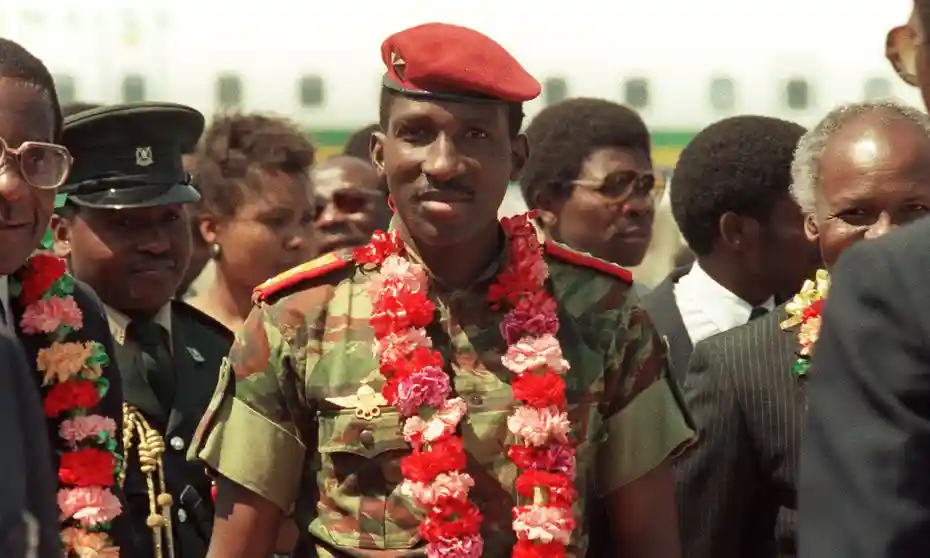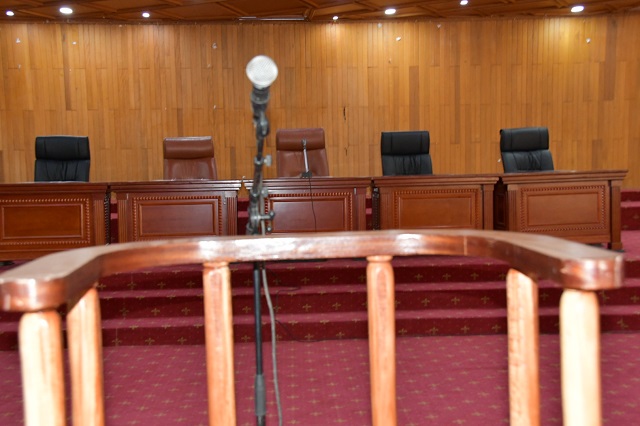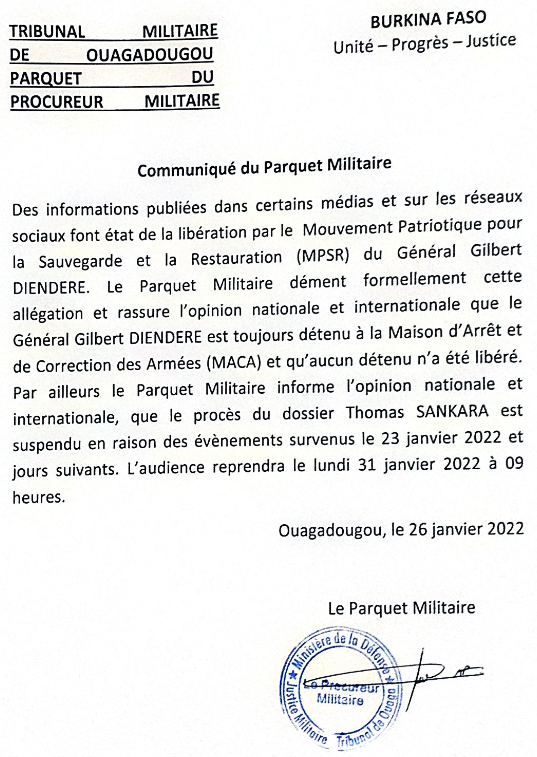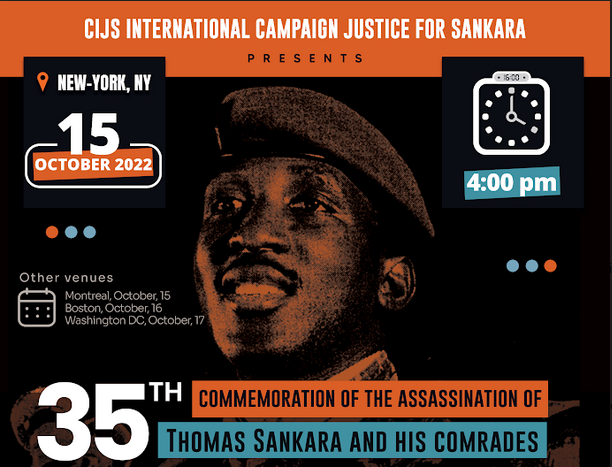
Press Release – ICJS – 35th Commemoration of The Assassination of Thomas Sankara and His Companions
Press Release
35th Commemoration of The Assassination of Thomas Sankara and His Companions
Press Release
35th Commemoration of The Assassination of Thomas Sankara and His Companions
The year 2022 was marked by many events in Burkina Faso. The international part of the trial was separated and a trial under military jurisdiction took place. On 23 January 2022, in the midst of the trial for the assassination of Thomas Sankara, a coup d’état was staged by the Mouvement patriotique pour la sauvegarde et la restauration (Patriotic Movement for Safeguard and Restoration), led by Lieutenant-Colonel Paul-Henri Sandaogo Damiba. The regime denounced the inertia of the Kaboré government against terrorism and announced its takeover. Shortly afterwards, the constitution was suspended and then restored, with exceptional measures.
The trial in the Sankara case resumed and the main defendants were sentenced to heavy penalties on 6 April 2022. Among them, President Compaoré, sentenced to life imprisonment in absentia for “attack on state security” and “complicity in murder”.
But negotiations with Abidjan had been going on for some time. A section of the political class argues that the former Compaoré regime, having made pacts with the jihadists, could restore peace.The return of the former president is called for and in the name of reconciliation, between parties that are not stated. A summit of the country’s former heads of state is then orchestrated by the Damiba regime. This is how Blaise Compaoré was received on 7 July 2022 with impunity. The red carpet was rolled out for him rather than arresting him, even though the summit failed. On 26 July, with a semblance of contrition, Compaoré asked for forgiveness in the press, without contacting the families and without acknowledging his heinous crimes, and above all without facing justice. The International Campaign for Justice for Sankara considered this failure of justice and the continuation of impunity unacceptable.
On 30 September members of the Patriotic Movement for the Safeguard and Restoration overthrew their leader and installed Captain Ibrahima Traoré. Once appointed president, he convened a national conference to be held on 14 and 15 October 2022 to allow a second transitional charter. This second day coincides with the date of the assassination of President Sankara and his colleagues.
The family of President Sankara has been waiting for 35 years for justice to be done, for the verdict to be carried out and for the international part of the trial to be investigated. The ICJS demands from the French, Ivorian and American authorities the disclosure of all archival documents relating to President Sankara. We demand a dignified national funeral in accordance with the wishes of the families. Moreover, there can be no reconciliation without truth and respect for the decisions of justice. The attempts at amnesty by the former regime’s caciques will not be accepted either by the Burkinabe or by pan-Africans throughout the world.
The assassination of President Sankara and the end of his revolution have nothing to do with the terrorist aggressions that affect the Sahel and Burkina. On this issue, the ICJS urges internationalists and pan-Africans around the world to show solidarity with the resistance of the Burkinabe people.
-30-
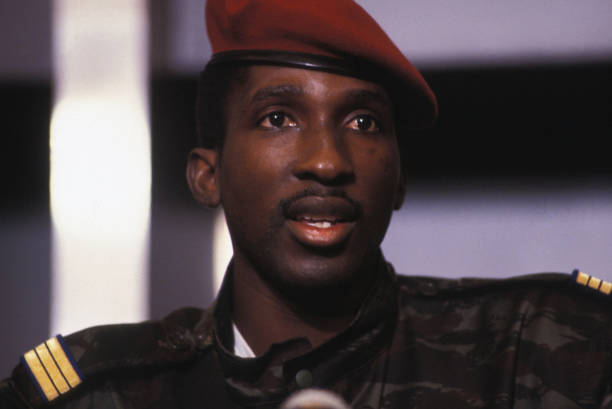
Press release 28 July 2022 – On President Compaoré’s visit to Burkina Faso and his request for a pardon
Press release 28 July 2022
ICSJ
International Campaign Justice for Sankara
On President Compaoré's visit to Burkina Faso and his request for a pardon
Nevertheless, the trial resumed and the main defendants were convicted on 6 April. Among them was President Compaoré, who was sentenced to life imprisonment in absentia for “attack on state security” and “complicity in murder”.
Already during the trial, rumours of negotiations with Abidjan were confirmed. A section of the political class argues that the former Compaoré regime, having made pacts with the jihadists, could restore peace. The return of the former president is called for and in the name of reconciliation, between parties that are not clearly stated. A summit of the country’s former heads of state was then orchestrated by the new regime.
This is how Blaise Compaoré was received on 7 July 2022 with impunity. The red carpet was rolled out for him rather than arresting him, even though the summit failed.
On 26 July, with a semblance of contrition, he asked for forgiveness in the press, without contacting the families and without acknowledging his crime and the odious assassinations he committed, and above all without facing justice.
The family of President Sankara has been waiting for 35 years for justice to be done. Since April 6, 2022, they have been waiting for the verdict rendered by independent judges after an exemplary trial to be executed. There can be no reconciliation without truth and respect for justice. The contempt shown by the new regime and by Blaise Compaoré for the verdict of the military tribunal, delivered in the name of the Burkinabe people, is shocking. The new authorities’ desire for amnesty, echoing the caciques of the old regime, will not be accepted either by the Burkinabe or by pan-Africans around the world.
The assassination of President Sankara and the end of his revolution have nothing to do with the terrorist attacks on the Sahel and Burkina. In line with the recent press release of the lawyers of the collective, the International Campaign Justice for Sankara considers this failure of justice and the continuation of impunity unacceptable.
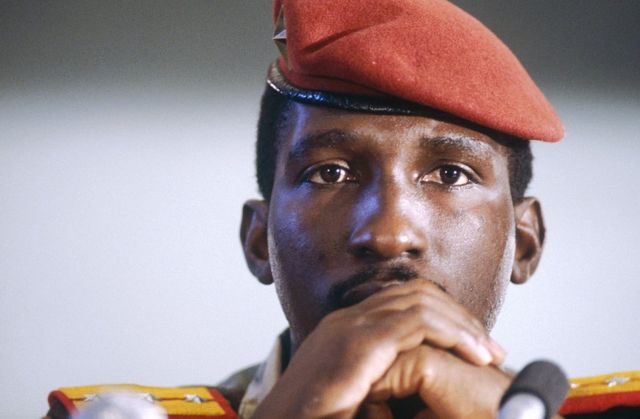
Message of the youth at the end of the procession
Message of the youth at the end of the procession

ICJS Press Release and Press Conference of April 6, 2022
ICJS press release followed by the opening statement to the
PRESS CONFERENCE BY THE LAWYERS OF THE FAMILY OF PRESIDENT THOMAS SANKARA
FOLLOWING THE JUDGEMENT OF
APRIL 6, 2022 BY THE JUDGEMENT CHAMBER
OF THE MILITARY COURT OF OUAGADOUGOU
OUAGADOUGOU, 07 APRIL 2022
The International Campaign for Justice for Sankara (ICJS), coordinated since 1997 by GRILA (Research and Initiative Group for the Liberation of Africa), takes note of the decision pronounced by the Honourable Judge Urbain Meda of the Military Court of Ouagadougou, on 6 April 2022. This judgment is the first of its kind in the history of the continent, and marks a precedent in the history of law. For most of the past 25 years, ICJS lawyers have been trying to get the law heard against the state, and then before a military court. They have always stood up against impunity. ICJS is grateful for all the pan-African and international mobilisation that has assisted it over the past 25 years. It salutes the memory of the victims and of all those who paid with their lives or gave their blood to bring this historic day to pass.
Thanks to the courageous mobilization of the people that drove out the Françafrique regime of Compaoré, the Honourable Judge Yameogo has re-launched the proceedings, in accordance with Burkinabe law and the rights obtained for the widow Sankara and her children before the UN Human Rights Committee in 2006.
Between March 6, 2015 and October 7, 2020, there was a successful inquiry in several stages and the trial reopened on October 11, 2021. Since France was slow to provide declassified documents, which it unfortunately only finally provided in a selective and incomplete manner, the trial resumed, disjointed from its international component.
Having refused our request to film and record its hearings for posterity, the court nevertheless held, in a specially requisitioned venue, a trial that will go down as a landmark in the legal history of Burkina Faso and Africa. The normal progress of the trial was disrupted for a time by a coup d’état, which put the constitutional legitimacy of the process in question. The permanence of the functions of the state allowed the trial to resume, and in full knowledge of the facts, the pleadings of the civil parties and the defense as well as dozens of witnesses were heard. Some defendants were convicted and others acquitted, as described in the attached opening statement. Large parts of the truth about the assassination of President Sankara and his comrades were revealed, despite the silence and denials of several of the accused. Whether they were running away or hiding, the last of the masterminds and assassins have seen their subterfuges publicly revealed and they are now facing their own conscience and history. We call on Côte d’Ivoire and France to hand over the culprits and to participate in the elucidation that would bring closure to this case.
The ICJS salutes the fighting spirit and courage of Mariam Sankara, the dignity of her family and the tireless work carried out by three teams of lawyers over the past 25 years. It has recommended vigilance and firmness for the respect of justice and a full investigation into the international plot. The ICJS salutes the mobilization of pan-Africanists and internationalists who supported it in achieving this result. The civil parties will appear in court on 13 April. ICJS hopes that peace and serenity will prevail now that the guilty parties have been convicted. It expects that the people of Burkina, confronted with jihadism and destabilization, will become reconciled and will recover their sovereignty as well as the momentum that has made them worthy of their title of the land of the upright people.
INTRODUCTORY STATEMENT
Ladies and Gentlemen
Fellow journalists
On behalf of my colleagues, I would like to acknowledge the work of the national and international press, which has been often at our side and at the side of the families of President Thomas SANKARA and his companions over the past twenty-five (25) years of legal proceedings. These proceedings followed the complaint of the widow Mariam SANKARA and her children Auguste and Philippe lodged on 29 September 1997 and the order of the examining Dean of magistrates dated 9 October 1997.
Allow me also to salute all the efforts of GRILA and CIJS, International Campaign for Justice for Thomas SANKARA and Professor Aziz FALL as well as the efforts of all those who, in the shadows as well as in broad daylight, have fought the same battle as we have for transparency and truth in the wake of the ignoble and odious assassination of President Thomas SANKARA and of 12 of his companions, which was followed by the massacre of many others. These included those tortured in Koudougou, wounded or forced into exile and others who suffered the consequences of the attack on 15 October 1987.
Ladies and Gentlemen of the media,
The lawyer is an auxiliary of justice who contributes to upholding the truth. The mission of the lawyer is not to trick the law, nor to deceive judges or try to mislead them. The lawyers’ mission is to defend their client’s interests to the best of their ability in accordance with the law, their ethics and their oath.
This is why we are unwavering in our commitment to a fair trial in which the rights of the defence, the presumption of innocence and the principle of adversarial proceedings are respected, which are always, whether one is a plaintiff or a defendant, an indisputable prerequisite of our profession, in order that the law is carried out in all its rigour, whatever the jurisdiction happens to be.
By definition the trial is the place where the rules and forms lead to a valid decision by the judge from the moment of referral. This is why we willingly lent ourselves to this unusually long exercise. Six months of trial is a long time, just as the wait to reach a trial was long. But to paraphrase our late colleague Dieudonné Nkounkou, no matter how long the night is, the day will eventually come.
Also, drawing the lessons of President Thomas SANKARA who said that “Where discouragement falls, there rises the victory of the persevering”. We have persevered in spite of adversity and multiple difficulties for twenty-five (25) years, during which time we have conducted all kinds of proceedings both at national and international level, before both civil and military courts.
Steadfastly, simply guided by our mission to obtain the truth and nothing but the truth, the trial against Blaise COMPAORE, known as Jubal, and others, prosecuted for attacks on state security, assassinations, complicity in assassinations, mishandling of corpses, and forgery of public documents, finally saw the light of day, despite all the vicissitudes and twists and turns that one can imagine. The trial, which finally opened on 11 October 2021, reached its epilogue on 6 April 2022 with the following decision, rendered after almost six (6) years of investigation (from 6 March 2015 to 7 October 2020, i.e. five (05) years and seven (07) months) and six (06) months of pleadings:
“Ruling publicly, in absentia with regard to COMPAORE Blaise and KAFANDO Tousma Yacinthe, and against BELEMLILGA Albert Pascal Sibidi, DEME Djakalia, DIEBRE Alidou, Jean Christophe DIENDERE Gilbert, KAFANDO Hamado, ILBOUDO Yamba Elysée, OUEDRAOGO Nabonssouindé, OUEDRAOGO Tibo, PALM Mori Aldiouma Jean-Pierre, SAWADOGO Idrissa, TONDE Ninda dit Pascal and TRAORE Bossobè, in criminal matters and at first instance:
Declares, the public action extinguished because of prescription; in the case of forgery of public documents reproached to the accused DIEBRE Alidou Jean-Christophe, KAFANDO Hamado and the facts of concealment of corpses reproached to the accused COMPAORE Blaise and DIENDERE Gilbert,
Acquits the accused TRAORE Bossobè of the charges of complicity in an attack on State security and complicity in murder for unproven offences;
Acquits the accused DIENDERE Gilbert of the charge of subordination of a witness for an offence not established;
Declares the accused TONDE Ninda, known as Pascal, alias Mang-Naaba, guilty of the charge of subordination of a witness
Declares the accused BELEMLILGA Albert Pascal Sibidi, DEME Djakalia, OUEDRAOGO Tibo, PALM Mori Aldiouma Jean-Pierre, ILBOUDO Yamba Elysée, SAWADOGO Idrissa and OUEDRAOGO Nabonssouindé, guilty of the acts of complicity in the attack on State security for which they are accused;
Declares the accused KAFANDO Tousma Yacinthe, ILBOUDO Yamba Elysée, SAWADOGO Idrissa and OUEDRAOGO Nabonssouindé, guilty of the acts of murder with which they are charged;
Declares the accused COMPAORE Blaise, DIENDERE Gilbert and KAFANDO Tousma Yacinthe guilty of the acts of attack on State security for which they are accused;
Declares the accused COMPAORE Blaise and DIENDERE Gilbert, guilty of the acts of complicity in murder for which they are accused;
As a consequence, condemns:
- BELEMLILGA Albert Pascal Sibidi and DEME Djakalia to five (05) years’ imprisonment, each suspended;
- TONDE Ninda dit Pascal alias Mang-Naaba to three (03) years imprisonment;
- OUEDRAOGO Tibo and PALM Mori Aldiouma Jean-Pierre to ten (10) years imprisonment each;
- ILBOUDO Yamba Elysée to eleven (11) years’ imprisonment;
- SAWADOGO Idrissa and OUEDRAOGO Nabonssouindé each to twenty (20) years imprisonment;
- COMPAORE Blaise, DIENDERE Gilbert and KAFANDO Tousma Yacinthe each to life imprisonment;
Orders the forfeiture of all titles or decorations of all the convicted defendants;
Declares that the present judgement is an order of detention for the defendants sentenced to a custodial sentence not covered by pre-trial detention in accordance with the provisions of Article 315-14 of Law N°040-2019/AN of 29 May 2019 on the Code of Criminal Procedure;
Issues, a warrant of detention against TONDE Ninda dit Pascal alias Mang-Naaba in accordance with the provisions of Article 315-14 of Law N°040-2019/AN of 29 May 2019 on the Code of Criminal Procedure;
Declares that the arrest warrants issued against COMPAORE Blaise and KAFANDO Tousma Yacinthe are maintained in accordance with the provisions of Article 261-128 paragraph 4 of Law N°040-2019/AN of 29 May 2019 of the Code of Criminal Procedure;
The President warned the parties that they had a non-negotiable period of fifteen (15) clear days from the delivery of this judgment to appeal, in accordance with the provisions of Article 317-9 of the Code of Criminal Procedure;
Orders the costs to be borne by the convicted defendants».
Indeed, the chamber of judgement of the Military Tribunal of Ouagadougou has just inscribed in gold letters, for posterity, the name of Judge Urbain MEDA and that of all the members of the chamber in the judicial history of Burkina Faso. They have courageously spoken the law and rendered justice in the name of the Burkinabe people.
This decision, if it is a victory, is firstly due to the merit of our main client, Mrs Mariam SANKARA, whose courage, bravery and self-sacrifice deserve to be saluted. Secondly, it is the fruit of the struggle of all women and men who cherish justice, truth, peace and freedom as cardinal values of human dignity.
Finally, this victory must be dedicated to the media, whose role was decisive in the search for and the manifestation of the truth around the assassination of President Thomas SANKARA and his companions.
Allow me then, on behalf of the families and my colleagues, to express to all the media our deep gratitude for this constant support in the name of freedom and justice.
Ladies and Gentlemen of the media,
On the basis of the above, we, the lawyers for the civil party, acting on behalf of Mariam SANKARA, her children and the family of Thomas SANKARA, take note of the decision handed down on 6 April 2022 by the Trial Chamber of the Ouagadougou Military Court.
We are pleased with the results we have achieved thanks to the methodical teamwork and commitment of the lawyers, who saw in the Thomas SANKARA trial the defense of a cause beyond family interests: that of African freedom and the fight against impunity.
It is true that there are still many grey areas, particularly in terms of international complicity. We will continue our quest for truth on this subject by immediately reactivating the Ouagadougou Military Tribunal, in order to find out the status of the investigations on the international aspect left to the investigation by the disjunction pronounced by Judge Yaméogo more than a year ago.
It is also true that the authors and masterminds of these crimes, Blaise COMPAORE and Yacinthe KAFANDO, may have fled their country in an attempt to evade justice, but the essential aspiration of the Burkinabe and African people and of public opinion in general has been achieved in the sense that the truth has come to light.
“No matter how long the night is, the day will eventually come.”
It is therefore without prejudice to the possible appeals of the defendants that we appreciate this decision, strictly from the point of view of the law, that has been stated and the justice that has been rendered in a fair trial that complies with international standards. We also take note of the sanctions that have been pronounced against some of the accused, which are commensurate with the gravity of the crimes they committed.
I thank you.
Me Bénéwende Sankara
On behalf of the Collective of Lawyers of the International Campaign Justice for Sankara
** Translated from the French

Verdict of the Sankara trial Document
Verdict of the Sankara trial – Document
Powered By EmbedPress
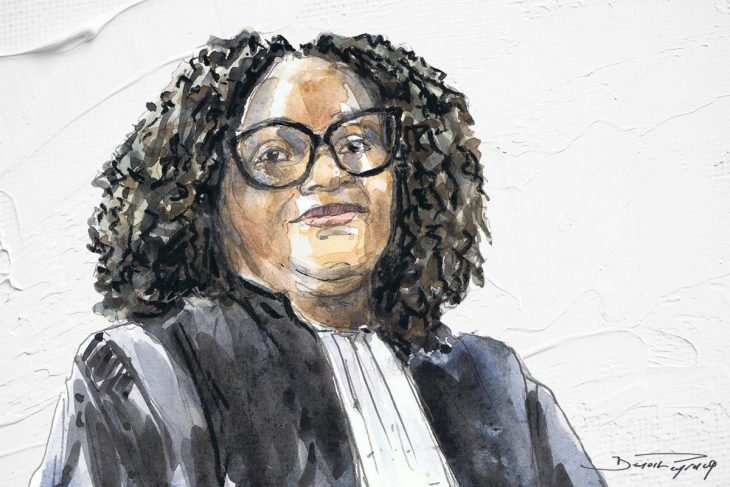
Anta Guissé: “The Sankara trial is a trial with history”
Anta Guissé: "The Sankara trial is a trial with history"
For more than twenty years, the French-Senegalese lawyer Anta Guissé has represented the defense before the international tribunals for Rwanda and Cambodia, as well as before the International Criminal Court. She has just pleaded for the families of the victims in the trial in Burkina Faso on the assassination of former president Thomas Sankara, whose verdict is expected on April 6. And shares her thoughts on the judgment of these extraordinary crimes.
JUSTICE INFO: On October 15, 1987, the president of Burkina Faso, Thomas Sankara, was assassinated along with twelve of his companions in a coup. Thirty-five years later, 14 people, two of whom are still at large, are being prosecuted for these murders and for “attacking state security and complicity in an attack”. That is to say, to quote your plea, for a crime “of exception in the midst of ordinary crimes”, a crime that “shakes the social order to its foundations”. In what way should this political assassination be considered a major crime, even if it is not an international crime?
ANTA GUISSÉ: The attack itself is a crime of exception, it is judged separately. Assassinations, on the other hand, remain crimes under common law. The particularity is that it affects a head of state. Burkina Faso has experienced many coups d’état, but this one is the bloodiest. It was a bloodbath in the form of a general execution. What is also particular is that it was premeditated and prepared, since at the same time as he was being killed at the Council of the Entente [the seat of executive power], they made sure to kill the people who were likely to be the closest to Sankara and could have intervened to thwart the coup.
It was a pivotal moment in African history, when we could have moved to a different way of approaching government on the continent, a different way of seeing the relationship between former colonizing countries and former colonized peoples. The fact that this was mowed down so violently and by his best friend [Blaise Compaoré, president of Burkina from 1987 to 2014] adds a somewhat Shakespearean dimension.
The personality of Sankara and this revolution in Burkina reminds me of the teenager I was at the time and what it meant to many people. I have leftist relatives and militant backgrounds; a Burkinabé friend often came to stay with us and died during those events. We always talk about the people killed at the Conseil de l’Entente, but unfortunately, other people died or disappeared in strange circumstances in the weeks and months that followed.
I remember an enormous sadness. I am in contact with Africans from all walks of life; when they learn that I intervened in this trial [as a lawyer for the civil parties], they all remember the day they learned of Thomas Sankara’s death – and they all wept. All of them, regardless of their nationality.
So it is the history of Burkina, but not only: because of Sankara’s extremely strong positions and speeches, it is the history of Africa. He was the king of the “punchline”! It was the time of the Houphouëts [Félix Houphouët-Boigny, president of the Ivory Coast from 1960 to 1993], of the Eyademas [Gnassingbé Eyadéma, president of Togo from 1967 to 2005], and Sankara was this young man who was leading a poor country but who suddenly found himself on the stage of the greats because he had this dignity, this willingness to work with what we have, to have another vision of development. There were certainly mistakes made during the revolution, but we cannot take away from Sankara that he was extremely honest and that made a big difference compared to the other leaders of the time and those who followed. It was a great hope that was totally destroyed.
Thirty-five years after the events, in judicial terms, the evidence may have disintegrated, but we also have the benefit of distance. We now see clearly who did what with this revolution.
We had a real trial, with ballistic experts and interventions on the facts: how people were killed, when, what happened in the months before October 15 and after.
JUSTICE INFO: Isn’t this what we call a trial for history?
Yes, but not only that. We had a real trial, with ballistic experts and interventions on the facts: how people were killed, when, what happened in the months before October 15 and after. I would rather say that it is a trial with history, in the sense that we have elements of understanding that we would not have had if we had judged the facts in the aftermath – for example, a certain number of French diplomatic cables that expose the various explanations given by the Compaoré clan, the tensions in “Françafrique” or in Côte d’Ivoire.
JUSTICE INFO: What do you remember about this trial? What did we learn?
That it was really premeditated, that it was many months old, even more. There had been several assassination attempts before. Thomas Sankara knew that his life was in danger and he voluntarily refused to enter into this spiral. We learned that Blaise Compaoré was a real traitor – we suspected it but it is now more apparent – and that he was a political animal. Both nationally and internationally, he had made sure that there would be no repercussions.
JUSTICE INFO: You have already acted as a defense lawyer before the Khmer Rouge Tribunal in Cambodia, where the facts were also being tried thirty-five years later. What is the function of a court in trials of this type?
I can’t see any parallel between the trial of Khieu Samphan [president of Pol Pot’s Democratic Kampuchea, between 1975 and 1979, sentenced to life imprisonment in 2014 and again in 2018 for war crimes, crimes against humanity and genocide] and the Sankara case. The Sankara trial is really that of an assize court; we are not only talking about political leaders, we are talking about the setting up of a commando. The facts are very different: we are not judging Compaoré on his management or his policies during his 27 years in power. It is really the attack that is being prosecuted. Of course, when we plead the case, we put the political dimension into it, but in the end, we are talking about the 13 assassinations that day. It is extremely precise, with people who held the weapons, who participated in the preparatory meeting, etc.
JUSTICE INFO: There are two major absentees in the trial: former president Blaise Compaoré, who has taken refuge in Côte d’Ivoire, and Hyacinthe Kafando, the leader of the commando group, who is on the run. To what extent has this diminished the value of the trial?
It did not diminish it. We could have had these defendants present but silent. Even if the Burkinabè would have liked to hear their voices.
JUSTICE INFO: The courts seized of these historical trials are often tempted to write history. How do you deal with the risk of jurists taking themselves for historians?
In the Sankara trial, the family did not want to rewrite history at all. For them, Sankara and his companions were assassinated by giving explanations that were false. And it was important to set the record straight. There was, of course, a historical context, but we were talking about very precise facts: that day, Thomas Sankara was killed as he was leaving the Council of the Entente and was not armed, he and his companions were executed. Period. This is a very factual development. It was a political assassination with the aim of taking power. We did not remake the history of the revolution. There were no experts on the historical context. We really talked to the actors and direct witnesses of the time.
Judges are not supposed to fight impunity; they are supposed to judge impartially.
JUSTICE INFO: And in the trial of the former Khmer Rouge leaders?
In this type of trial, the role of the defense is to remind people that we are before a criminal court. We are there to judge a man on acts that he is supposed to have committed. At the Khieu Samphan trial, we were told about the Khmer Rouge, the regime, etc. The relationship between the man and the facts is diluted. The fight against impunity is presented as the flagship of these courts, whereas the fight against impunity is the sole responsibility of the prosecutor. Judges are not supposed to fight impunity; they are supposed to judge impartially. This is where the problem often lies. We are dealing with extremely complex facts, with modes of responsibility, notably the “joint criminal enterprise”, where it is said that the accused did not need to have the desire to commit a crime to have committed it, and that it was sufficient that it was a foreseeable consequence. How can one be responsible for a crime that one did not want to commit? These are intellectual constructs to ensure that people, who were political leaders at a given time, can also be criminally responsible for facts that are far removed from their person. One understands the moral will [that underlies this objective] but one can arrive at totally schizophrenic positions on what it is to commit a crime and what criminal responsibility is. These are trials where there is a presumption of guilt. We remind, in defense, that in criminal cases, there is a presumption of innocence.
We put a lot of expectations in these trials, omitting to say that they will never offer everything we want. We hear great speeches about the fight against impunity, reconciliation, and truth, but on facts as complex and as extended in time as these, there is not only one truth – and this is specific to any trial.
Some jurisdictions are designed to clear the conscience of international opinion. I am not very sure that international jurisdictions really serve to avoid the repetition of facts.
JUSTICE INFO: But there is often a tension between the criminal and the historical. In Cambodia, before the opening of the first trial, the international prosecutor declared before an assembly of Cambodians that it was not a question of judging an ideology. A man from the countryside stood up in the room and told him that in this case he was only prosecuting “smoke”. In everyone’s mind, these trials were obviously judging an ideology. How do you understand this tension, when ideology is at the heart of the crime?
In the case of the Khmer Rouge, one of the major legal problems was that we were told that the political vision of the Khmer Rouge was not in itself criminal, but that the means used were necessarily criminal. We were in the middle of a big gap. The theory of a joint criminal enterprise, in which the crimes were foreseeable and the defendants were responsible, did not apply. And it was necessary to retain this mode of responsibility. We said that if one is transforming a mode of responsibility because one cannot make the link with the crimes otherwise, one is not making law. We never argued that there were no crimes at such and such a place; we simply said: his participation in such and such a meeting does not lead to the conclusion that he participated in the commission of these crimes.
There is a more philosophical question behind your question: is a criminal trial the right form for this type of case? This is a real question and it is all the more problematic in the case of particularly old events, where the most direct perpetrators are dead.
I think that if Khieu Samphan had not been the last of the Khmer Rouge leaders alive, we would not have reached the same result. At a certain point, one does with the means at hand and says that there is no other way than to condemn. After the first conviction of Nuon Chea [former number 2 of the Khmer Rouge regime, sentenced to life imprisonment in 2014 and again in 2018 for war crimes, crimes against humanity and genocide] and Khieu Samphan, a newspaper established the amount of money spent to reach this judgment and said that we finally had his justification. When it comes to individuals who are essentially politically responsible, far from the facts, one must read the justifications, but the judgments are 2600 pages long and no one reads them. If one does not try to understand but only to validate a starting postulate, what was the point of a trial?
I believe very much in the pedagogical value of a trial. Certain jurisdictions are designed to allow international opinion to wash its conscience a little on situations in which it did not intervene. I am not very sure that the jurisprudence of international courts really serves to avoid the repetition of facts. Those who are often missing from the dock are those who had the power to make decisions at the time of the crises. Whether in the Central African Republic or in Rwanda, it is frustrating to know that there were United Nations missions on the ground and that the crimes were not prevented. This should challenge us: what are we doing wrong to make this happen again?
JUSTICE INFO: You defended Khieu Samphan, a revolutionary who served a reviled ideology that destroyed millions of lives in the name of class struggle. Your Rwandan clients were accused of embracing a racist ideology that cost hundreds of thousands of lives. In the Sankara trial, you represented the families of the collaborators of a man revered for his anti-colonial, pan-African ideology and visionary ideas. Was it a breath of fresh air for you to be on the side of the victims and a positive icon?
I have always enjoyed being a defender because I like to take the time to try to understand and not have a Manichean view of things. In the Sankara case, there is a more personal dimension, assisting the family of a person I particularly admire and who played an important role in my personal development. It’s a breath of fresh air because it’s a different way of working, the pressure is different. In my other defense trials, there is a much more intellectualized aspect. In Sankara, the affect was clearly more important. In my plea, I was overwhelmed by emotion and I did not expect it. I have sometimes been very moved when listening to people testify in international tribunals, but when I was pleading, it was new. To “defend” an icon whom one has respected is a special professional experience, one of the most beautiful I have ever had.
JUSTICE INFO: Was it nicer to be loved by the public, instead of being the ugly duckling?
It’s a job where you learn to be loved one day, and not the next. I look at this with a little amused distance. Of course, it’s more pleasant, not to be loved – that’s a very furtive feeling – but to carry the word of a family and to represent a man who had a vision and who died of it.
JUSTICE INFO: Could you have been a defendant in the Sankara trial?
No, I couldn’t, I wouldn’t have accepted. Because of affect. The lawyer has to go where he knows he can do a good job.
JUSTICE INFO: How could the Cambodians understand this when you accepted to defend Khieu Samphan there?
Again because, for me, it was perhaps easier to put an intellectual distance with facts about which I had no personal history. You don’t necessarily do a good job if you’re too close.
JUSTICE INFO: Rwanda, Cambodia, Burkina Faso: in all these cases, the defense lawyers in particular point the finger at foreign responsibilities, which are never judged by these criminal courts. How do you feel about this hollow trial that never comes to fruition?
This is one of the freedoms that we have as lawyers, to put all this forward. There is the trial in the courtroom and what will come out of it to fuel a debate outside. What you put forward in a court of law can feed another discussion.
JUSTICE INFO: But is it a source of frustration or do you accept it that way?
It’s a question of power, of [power relations]. I don’t accept it, but we can denounce it. Bringing these flaws to court is a way of exposing them. I am well aware that states act according to their interests and that, as long as the balance of power is like that, it is difficult to change things. It is not a trial that changes the world. The fact that we are only dealing with individual responsibility implies that we are only interested in one part of the problem.
JUSTICE INFO: You often denounce international justice as being “out of touch” and here you are again as defense counsel in the trial of Central African Alfred Yekatom before the International Criminal Court. What justifies your continuing to do so?
There is a particular adrenaline in these trials. In defense, we have the means to explore things that we cannot necessarily do in a national practice. The real question is the way in which the debates are conducted at the hearing. It is true that after having tasted national justice in the Sankara trial – even if on different facts – knowing that the public can come, that it follows what is said in the press on a daily basis, that the actors speak openly, gives us a particular impact that we do not necessarily have in an international jurisdiction.
Like many Black men and women who achieve some professional visibility, we know that we want to do well since, given the prejudices, that would risk closing the door on ten others who are behind us.
JUSTICE INFO: Being a woman and being a black woman in these international courts, what does it matter?
It’s more a matter of perception among people. Like a lot of Black men and women who manage to get some professional visibility, we know we want to do well since, given the prejudice, that would risk closing the door on ten others who are behind us. It’s a responsibility. Even on the side of the accused, there is this notion that being defended by a white man is always better than by a black woman. It is a question of countering this before international jurisdictions that are often inaccessible to professionals who come from the South. Who can afford to do even an internship there? For a young lawyer from Latin America, Africa or Asia, you have to hang on to get a Schengen visa. It is still a system for the rich, despite the efforts made. We know that it gives us a little hope to know that there are also people who look a little like us and who can be in the courtroom.
If it is a question of international justice and confronting the universal, then I am the symbol of universality. I am at the crossroads of many stories.
JUSTICE INFO: In Cambodia, for example, was there a moment when you felt, well beyond the trial, that you were succeeding in eroding stereotypes?
I can’t say that I think about this every morning when I wake up. I’ve seen on the streets of Phnom Penh that you don’t necessarily see black women like me – let alone in a lawyer’s office. So yes, we break the stereotypes. I am not a sportswoman, I am not a dancer, I am not a singer. I’m a lawyer in a black dress [laughs]. I was ‘mè thirvi khmao’, the black lawyer. Even the client might have wondered if he was taking the risk. Someone on the [defense] team told me that when it came to choosing, my client said, “Oh yeah, that would be modern.”
And then, if it’s about international justice and confronting the universal, well, I’m the symbol of universality. I am at the crossroads of many stories. But in the end, it has to be anecdotal: it’s what is said that is important. To finally see heroes who look like us on TV, to be able to project ourselves, it’s important when you’re black and you’re a woman. It should stop feeling good and just be normal but it’s not yet.
How to talk about immigration, raw materials, development problems, without talking about that, about the traces of the colonial past?
JUSTICE INFO: The colonial past is back on the table of justice and reparations. You are a woman of law, of Senegalese descent – the country of Léopold Sédar Senghor – and Martinique – the country of Aimé Césaire. What does this return of the colonial era and this demand for justice inspire in you?
What I see in France is a real regression. We are coming to a time when we can begin to see history in the face, but as much as the discussion is taking place, on the political level I hear the backward-looking and retrograde speeches of Zemmour, Le Pen and consorts [Éric Zemmour and Marine Le Pen, two far-right candidates in the presidential election in France]. Even among people on the left, there was this idea of what the colonies, education, etc. brought, and of denying things. How can we talk about immigration, raw materials, development problems, without talking about that, about the traces of the colonial past? It would be a real catastrophe if we could not have this discussion. It would be nice to have people who are a bit uncomplicated to talk about it, without having speeches like “France, you either love it or you leave it”, to be more subtle than that. The discussion could be healthier, it is not yet but it is on the table.
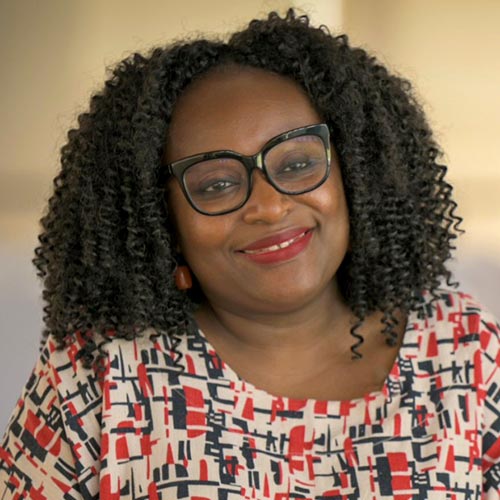
ANTA GUISSÉ
Anta Guissé has been a member of the Paris Bar (France) since 1999. She regularly pleads before national criminal courts. Between 2002 and 2010, she worked on several defense teams before the International Criminal Tribunal for Rwanda. In 2012, she became international counsel for former President Khieu Samphân before the Extraordinary Chambers in the Courts of Cambodia. Since 2021, she has represented Central African Alfred Yekatom before the International Criminal Court. In Burkina Faso, she defends the family of Thomas Sankara in the trial of his presumed assassins.
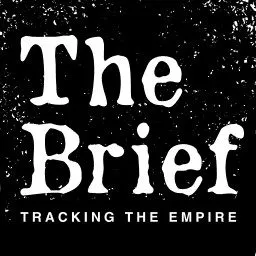
The Brief Podcast – Sankara’s revolution
Sankara’s revolution
Thomas Sankara’s assassination in October 1987 abruptly ended the life of a revolutionary Pan-Africanist who transformed Burkina Faso in four years of remarkable revolution. We are joined by AMBER MURREY and AZIZ FALL to discuss Thomas Sankara, his political project in Burkina Faso, his anti-imperialism abroad and their book A Certain Amount of Madness: The Life, Politics and Legacies of Thomas Sankara.
Episode: 024 Sankara’s revolution
Date: 18 February 2022 | Length: 73:45
Bonus: Aziz Fall on the Sankara trial: 17:26
Support The Brief Podcast on Patreon
Briefing Notes
- Murrey with Aziz. A Certain Amount of Madness: The Life, Politics and Legacies of Thomas Sankara (Pluto 2018)
- Sankara. We are the heirs of the world’s revolutions (Pathfinder Books)
- Burkina Faso Military Coup Reflects Wave of Insecurity in West Africa (Black Agenda Report)
- Turse. “Another U.S.-Trained Soldier Stages a Coup in West Africa.” (Intercept 2022)
- GRILA: The Group for Research and Initiative for the Liberation of Africa
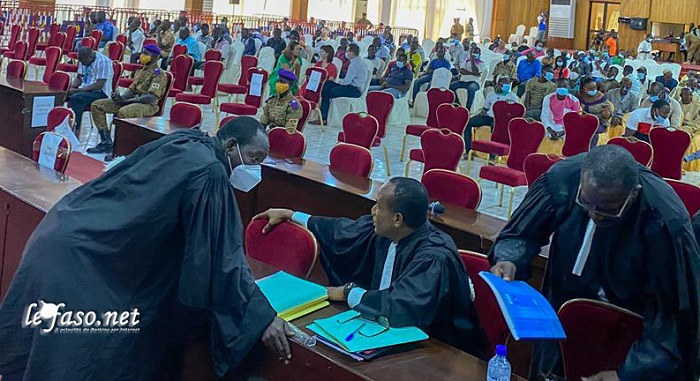
Press Release January, 26 2022
Press Release January 26, 2022
On Monday, January 24, 2022, closing arguments were to be heard in the trial of Sankara and his twelve murdered companions. Our lawyers’ collective was hard at work to finalize this effort that began a quarter of a century ago. However, a coup d’état occurred that day and the president of the court postponed appearances until the following day, Tuesday, January 25. The President of the Court then explained to the parties that due to reasons beyond his control, the session was suspended and he would return to the parties in due course.
Following the overthrow of the Compaoré regime, the new political regime had allowed the case to proceed. The trial took place before the Chamber of First Instance of the Military Tribunal of Ouagadougou, relocated to the Banquet Hall of OUAGA 2000. Following Judgment No. 06 of April 13, 2021, several persons were indicted and heard, whenever possible: in absentia KAFANDO Hyacinthe for attack on state security and murder; in absentia COMPAORE Blaise for concealment of bodies attack on state security, complicity in murder; DIENDERE Gilbert for complicity in murder, attack on state security, witness tampering, concealment of bodies; OUEDRAOGO Nabonswende, SAWAWADOGO Idrissa, ILBOUDO Yamba Elysee, OUEDRAOGO Tibo, BELEMLILGA Albert, Pascal Sibidi, DEME Djakalia, PALM Mori Aldjouma Jean-Pierre, TRAORE Bossobe, for complicity in an attack on state security; DIEBRE Alidou Jean Christophe, KAFANDO Amado for forgery and TONDE Ninda dit Pascal for subornation of witness; TRAORE Bossobe for complicity in murder; OUEDRAOGO Nabonswende, SAWAWADOGO Idrissa, ILBOUDO Yamba Elysée, for murder. Dozens of witnesses also appeared in person or remotely and the minutes of the deceased were read.
The trial, which the authorities refused to record, has so far been conducted in satisfactory conditions.
The ICJS insists that the trial should proceed and expects the new authorities to allow, in the best possible conditions, a full and fair completion of this historic trial. The ICJS also expects that the judge in charge of the disjunction on the international aspect could carry out his investigation and complete his case. This would allow for truth and justice to finally served and for a possible reconciliation.
The people of Burkina Faso and the whole of Africa deserve this opportunity to end this chapter of impunity.

